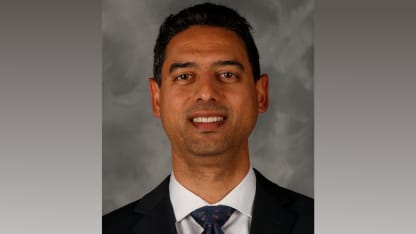Mehta's pioneering role in analytics leads him to Panthers front office
Florida's vice president of hockey strategy & intelligence had variety of careers before joining team

The vice president of hockey strategy & intelligence for the Florida Panthers since September, Mehta forged his unconventional path by seizing opportunities and eventually combining his knack for numbers with his love of hockey. A rare South Asian in the NHL community, Mehta was also the first person to hold a full-time analytics position when the New Jersey Devils hired him in 2014.
Mehta, from Northern New Jersey, was first exposed to hockey as a child watching the Devils practice on one of the two sheets at the local rink in Totowa. His mother, who is from India, and his father, who is of Indian descent, didn't really know anything about hockey, but she would take him and his sister there to skate. And the Devils had just recently moved to New Jersey from Colorado in 1982.
"They just practiced out in the public," Mehta said with a laugh. "It was the mid-80s. It was very, very different. Like there'd be more people at the public skate than there would be watching the Devils practice. But little 7-year-old me, was like, enthralled by this. I would just stand there up against the glass and watch the Devils practice, day after day."
He played hockey through high school, then went to the University of Miami to study music and after graduation, he worked as a professional guitar player in New Orleans.
Even though his career path took several unexpected turns, math was always played in integral role in his work. And playing poker forced him to learn a lot about probability and statistics. He then became more interested in the subject after reading "Moneyball: The Art of Winning an Unfair Game," by Michael Lewis, which chronicled Major League Baseball's Oakland Athletics and their analytical approach to the game.
"I found the relationship pretty strong in terms of using math to solve problems that you wouldn't necessarily think could help you solve problems, whether that was predicting the outcomes of baseball players or predicting the outcomes of poker hands," Mehta said. "And so for me, I think it was just a natural next step, to say, well, wait a sec, if people are doing this in baseball, what about hockey?"
He became part of a small community of people who were publishing hockey-analytics work online. He first had to learn to code, which he did through reading Bayesian statistics books by Jim Albert, a professor and author that he also peppered with emails to answer questions he had.
Mehta's online work led him to a consulting analytics job for a prospective NHL owner, and when that ended, he went from playing poker to trading options in Chicago.
Around that time, in 2013, Josh Harris and David Blitzer purchased a majority stake in the Devils. Being finance-minded themselves, they wanted an analytics department and a recruiter found Mehta.
Mehta describes the process as a grueling six weeks of flying back and forth between Chicago to New York to do interviews with the new Devils owners, and then-team president Lou Lamoriello. But by that point, he had more experience in hockey analytics than most anyone else and was a lifelong Devils fan who'd been watching their games for decades no matter where he was living.
"That was definitely helpful to be able to talk to Lou because Lou, obviously, you know, his reputation. He's tough, he's very tough, and was tough on me too in that interview," Mehta said. "But I think I was able to kind of handle that, because I had a pretty good knowledge base, both the subject, as well as the team, so I'm sure all those things kind of helped."
After four seasons, Mehta left his job with the Devils in 2018, deciding that even though he loved his time there, it was time to move on. He got his master's degree in data science while also serving as a consultant for the Washington Capitals and several baseball teams.
When Bill Zito became Florida's general manager in September, he chose Mehta to lead his analytics team. Zito had met him at a MIT Sloan Sports Analytics Conference a couple of years prior, and they kept in touch as friends before Zito called him about this new position.
The first challenge of Mehta's time with the Panthers was getting ready for the 2020 NHL Draft, which took place just two weeks after he was hired.
"There was almost no planning whatsoever," Mehta said. "We just all kind of got thrown into the fire. But in a lot of ways, I actually think that was really good. Because No. 1, there's no time to think. It forces everybody to just get on the same page and get along because you all have the same common goal, which we definitely did.
"I look back on that very proudly and say, all these different people from different walks of life, and we'd never met each other, a lot of us. And we all kind of came together for this common goal and achieved it. I mean, don't get me wrong, it was stressful. Those two weeks were really, really stressful. But it was awesome. You know, it kind of set the tone for, I think, the whole organization going forward."
The Panthers have built a front office staff with a blend of experience in both traditional and modern evaluation philosophies, and Zito credits Mehta's ability to make the analytics team's work accessible with helping to galvanize the staff. It was a quality that helped him from the start in selling the value of hockey analytics when it was a new concept and he was met with skepticism.
"We just liked him genuinely, as a person," Zito said. "And then professionally, I think there's a lot of bright people, but he has an uncanny ability to digest incredible amounts of information rapidly regurgitate them, simplify them, and then project them back out to whoever his audiences. That's a remarkable skill there.
"I think there's probably many people who can see things the way he sees them or calculate the way he calculates, but probably not interact with others, and then subsequently, develop those ideas and refine them. I think one of his greatest strengths."
Mehta didn't have a typical hockey resume by the time he started his career in analytics and was trying to break into a sport that can lack diversity, especially at high levels. But his experience in the finance world showed that in an ultra-competitive environment where everyone is focused on a singular goal, whatever it may be, it's to everyone's benefit to have access to the best talent available, and not create unnecessary barriers.
He knows he was fortunate to get into analytics early but believes hockey can be more inclusive if the avenues are there for everyone who has the talent and aspiration, like they have been for him.
"This is not necessarily unique to hockey," Mehta said. "There's plenty of jobs where there are barriers to entry. As it pertains to hockey, do I think things are all equal in terms of opportunity? Absolutely, not. I think, though, it's the opportunity that's the most important thing. Making sure that folks have that opportunity."

















